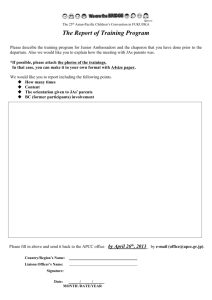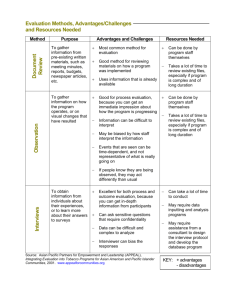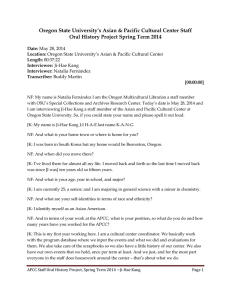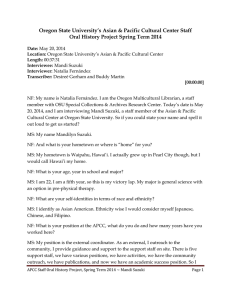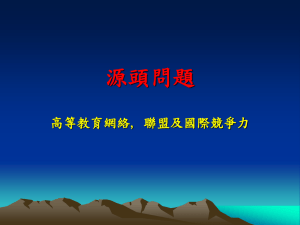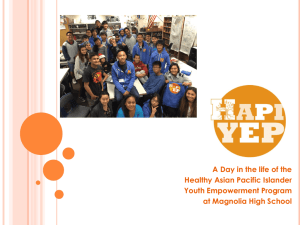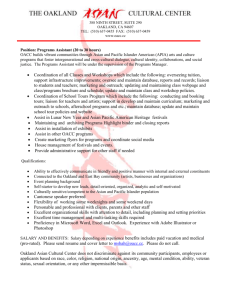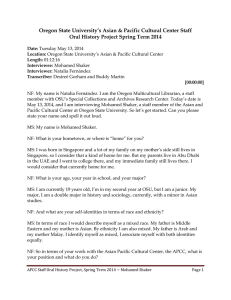Oregon State University’s Asian & Pacific Cultural Center Staff
advertisement
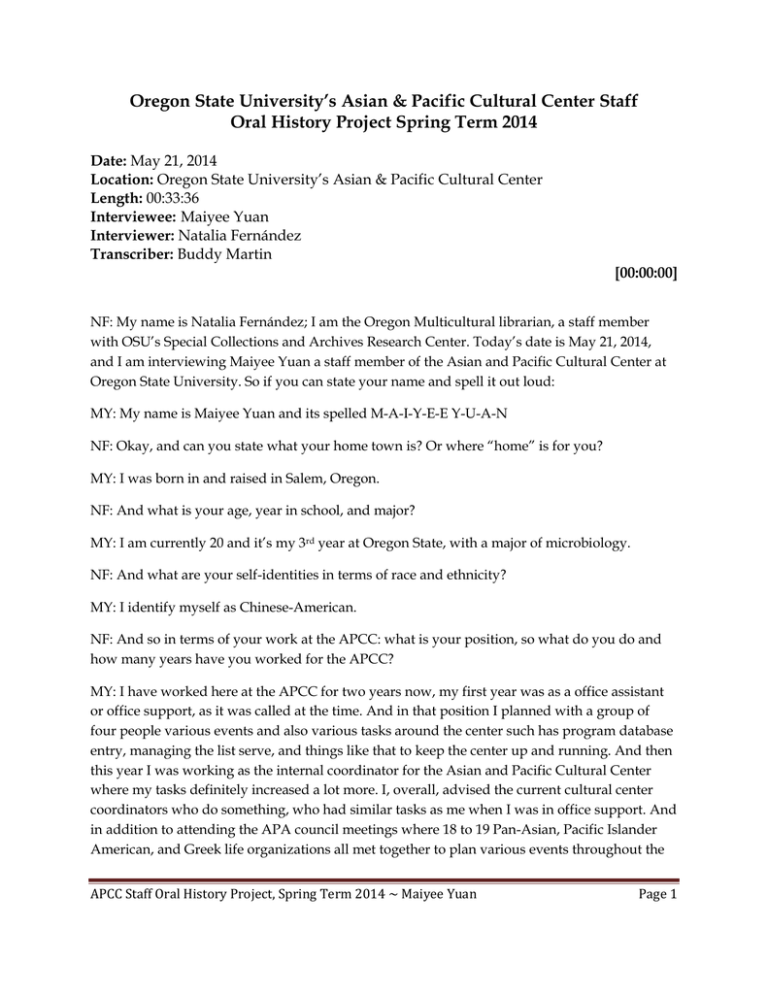
Oregon State University’s Asian & Pacific Cultural Center Staff Oral History Project Spring Term 2014 Date: May 21, 2014 Location: Oregon State University’s Asian & Pacific Cultural Center Length: 00:33:36 Interviewee: Maiyee Yuan Interviewer: Natalia Fernández Transcriber: Buddy Martin [00:00:00] NF: My name is Natalia Fernández; I am the Oregon Multicultural librarian, a staff member with OSU’s Special Collections and Archives Research Center. Today’s date is May 21, 2014, and I am interviewing Maiyee Yuan a staff member of the Asian and Pacific Cultural Center at Oregon State University. So if you can state your name and spell it out loud: MY: My name is Maiyee Yuan and its spelled M-A-I-Y-E-E Y-U-A-N NF: Okay, and can you state what your home town is? Or where “home” is for you? MY: I was born in and raised in Salem, Oregon. NF: And what is your age, year in school, and major? MY: I am currently 20 and it’s my 3rd year at Oregon State, with a major of microbiology. NF: And what are your self-identities in terms of race and ethnicity? MY: I identify myself as Chinese-American. NF: And so in terms of your work at the APCC: what is your position, so what do you do and how many years have you worked for the APCC? MY: I have worked here at the APCC for two years now, my first year was as a office assistant or office support, as it was called at the time. And in that position I planned with a group of four people various events and also various tasks around the center such has program database entry, managing the list serve, and things like that to keep the center up and running. And then this year I was working as the internal coordinator for the Asian and Pacific Cultural Center where my tasks definitely increased a lot more. I, overall, advised the current cultural center coordinators who do something, who had similar tasks as me when I was in office support. And in addition to attending the APA council meetings where 18 to 19 Pan-Asian, Pacific Islander American, and Greek life organizations all met together to plan various events throughout the APCC Staff Oral History Project, Spring Term 2014 ~ Maiyee Yuan Page 1 term, and I also managed the center’s email. Also like keeping track of various documentation that are needed for events and various purchase requests. So a lot of like in-center management. NF: Great, and what drew you to that position in particular? Why did you apply to that one? MY: I have a really, I have a sense of home here at the APCC, and I wanted to be able to be in a position to spread awareness and create an environment where other people can also feel like it is home and in my previous position I feel like I was still kind of working within some boundaries; I was hoping that as internal coordinator I could work at a high level with the administration with the students as well and kind of pervade that connection between the two groups and to kind of bridge that gap and form this new innovative and… I don’t know where I was going with that [laughs] NF: That’s okay, so have you worked with any of the other cultural centers or just the APCC? MY: I only worked for the APCC. NF: And why did you initially work with the APCC when you applied to be an office support person. MY: I initially applied because I felt like at the APCC there was this unique sense of warmth and of welcoming that was really nice that I wish I could be a part of and then also there was so much opportunity in that position as well to grow as a leader and grow as a person who could understand more about the issues surrounding like the Asian and Pacific Islander community and it just, really it attracted me because I feel like I have grown also as being a public speaker and also a person that would interact with other people while doing greetings, making speeches, giving tours. So I am really glad that I took on the position because I feel like I have gained a lot from it. NF: So you have talked about this a little bit, but what were your expectations, your hopes for your work here and were they matched, surpassed, not matched? [00:05:07] MY: I have to say that a lot of times my expectations were not, how do you say, that were not completely fulfilled, but at the same time there were things I weren’t expecting that I gained. I was hoping that by working here I would be super insightful about all the issues affecting like Asian and Pacific Islander communities but I soon realized that it was very difficult and it wasn’t as easy as it seemed. But at the same time it provided me a lot of opportunity to find out about these issues. So I think, for me, it was just creating that culture of wanting to know, wanting to find out, and being able to attend conferences such as the Oregon students, what is it OSOC? Oregon Student Association of Color…Something along the lines, sorry for the quote. And also we recently attended the Asian Pacific Desi Islander…wait, Asian Desi Pacific Islander APCC Staff Oral History Project, Spring Term 2014 ~ Maiyee Yuan Page 2 American Freedom School where we were able to learn about the identities and the various issues surrounding the communities. So I think it was really great being able to fulfil my expectations, but I feel like at the same time I had to put in the effort as well to be willing to learn about these things. NF: And were these conferences here in Oregon or were they national? MY: They were Oregon conferences, and I feel really grateful because through my understanding of various processes around funding and the school system, I was - I understood the department sponsored us to go to these conferences so I am really grateful for the opportunities otherwise I probably wouldn’t even know or even attend these. NF: And you attended these conferences with the other staff members here at the APCC? MY: Yeah, conferences are totally optional, so those who are interested are those who do happen to have the time - you know with sign up, we would let the people know and arrange rides and whatever else we need. NF: That’s wonderful. So can you describe some of the projects, events, activities over the past of the two years that were especially meaningful to you? MY: For me I feel like one of the first events that I would say that I planned a major part of would be our open house at the beginning of this year. Because over the summer - well open house occurs literally the first week of school and so over the summer I was the only one working at the Asian and Pacific Cultural Center where I had to look through past records and I had to organize program and I felt like that was a time where I really grew and I really grew to appreciate all the records that were kept from past coordinators as well because they really helped me in understanding that in the past it really helps us plan for the future in that sense. But also event planning isn’t easy and we can kind of get lost in it sometimes as students to balance our work and our school work and also our extracurricular as well. And then another one I felt like, was really important to me was, I didn’t personally plan this one but this was an event that occurred last term called “Asian and Pacific Islanders in the Media” and this was an event that I was working with the cultural center coordinators with. They wanted to do an event where it wasn’t just socializing and having fun or serving food. So we targeted the portrayal of certain stereotypes surrounding Asian and Pacific Islanders communities and how prevalent in like Hollywood or even on TV shows, things like that. And I feel like at this moment I felt as a leader and as someone who is supporting our new staff members I felt at that moment like there was this evolution of leadership and being able to target certain issues that aren’t quite talked about a lot that need to be in our line of work. [00:10:26] APCC Staff Oral History Project, Spring Term 2014 ~ Maiyee Yuan Page 3 NF: Great, anything else? MY: I would say pretty much all of our events, I want to highlight all of them and bring out the giant binder right now but at the same time it’s really hard to pinpoint all of the events that were like, significant to me because everybody puts in so much hard work onto their events and its crazy how in as little as an hour or two it’s over and then you move on to the next thing. NF: About how many events on average would you say you do per term? MY: Per term? NF: Or per month if that’s easier to count. MY: I would say, okay, so event coordinators have to plan two per coordinator that makes four and then two for the outreaches as well that makes six, and then one for the cultural center coordinators - so I would say we have about seven to nine events per term. But especially during spring term and our heritage month of May we have as much as twelve. So I know that a lot of times these events are collaborations ‘cause we want to show community, we want to show solidarity to everybody at OSU, and also communities outside as well. So I am really amazed and proud of everybody who has like, put in the work and who make all these events such a success. NF: Great, so what have been some of your challenges working at the APCC and how have you overcome them? MY: I have to say, even now, there’s a lot of, I don’t want to say disorganization, but a lack of records perhaps? Though we have archives it’s mostly stuff we do based on media such as photography or flyers or crafts. So a lot of that history of like the actual event planning and the contacts or the semantics of you know, that come through experience such as when is the best time to host an event what location to people pass by more. It’s lost though every year because there is a hiring process that occurs and since the staff have been traditionally all student based, a lot of the experiences were not recorded in the past but thank goodness we have Reagan now who is our professional staff at APCC. So we hope that with that position will retain the records more and have more consistency from year to year. But also I have made a lot of changes this year on keeping track of forms, keeping track of idea sheets, so that future maybe they can look back and see what went well what didn’t go well and hopefully become more innovative as the years go on. NF: So in addition to the great projects and events that you have done, what do you consider your successes working at the APCC? APCC Staff Oral History Project, Spring Term 2014 ~ Maiyee Yuan Page 4 MY: I have to say a lot of times the successes are definitely not my own, it’s definitely a group effort and for me I feel like just having more people who are interested in working here at the APCC, more people who are visiting who have never been to the center before. So just gaining more exposure and also for our new building to be moving to a more central location on campus - I feel like it’s really great in getting our purpose out there and fulfilling our goals as a the Asian and Pacific Cultural Center as well. NF: Can you describe some of your interactions with staff from the other cultural centers? [00:15:00] MY: Well here is several ways that we interact both on a professional and professional colleague basis versus a friend basis. So I am really glad we have separate cultural resource centers ‘cause it helps highlight the issues and I guess the struggles that each community faces. But at the same time its hard building those connections between these communities as well as if someone has overlapping identities to be able to acom-, not accommodate but to cater to all the people and their different backgrounds. But for me, we have weekly - we have monthly coordinator meetings where all the internal and external coordinators in addition to the graduate teaching assistants and the now professional staff of all the cultural resource centers come together and we meet about an hour or two and discuss about things that are going on throughout our centers and about upcoming projects that we might want to collaborate on. And for me I work at the APCC and I want people to come in and I want people to visit so I try to do the same for the other cultural resource centers - to drop in to say hi to see how things are going; I think a little goes a long way. And Just to see somebody, I identify solely as Chinese American but to see somebody who is, does not identify with certain labels associated with the center to come in I feel is very, I guess it’s just a very liberating feeling to have people know that you don’t have to identify a certain way to come and visit. And yeah, like if we see each other around campus its very causal relationship. It doesn’t feel like it’s very restricted to like work or anything like that. NF: Great, so let’s talk about the new center. So the APCC will be moving and you just had the groundbreaking earlier this term. So can you talk about, if you were involved in any of the design process or the groundbreaking ceremony or anything you had to do with the new center? MY: The design for the new center was actually determined probably throughout a span of, I don’t know like five plus years so I unfortunately did not have much of the plan in the blueprints. However, after working here at the APCC, I have been working on a lot of efforts in getting the new center up. So I know we had a little run in with the historical district and the building of about a year ago. And so there was an appeal to I guess pass the design of our center. From what I understand there was an issue with building within a historical district but APCC Staff Oral History Project, Spring Term 2014 ~ Maiyee Yuan Page 5 not accommodating to the current buildings that are there. So making the APCC, or making a new building that looks like, that is cohesive to the rest of the buildings that are already present and one of the exceptions we had to have a cultural that had to have cultural relevance. And so I guess the issue with our design was that it was not as culturally relevant as it could be, so our great architects like redesigned a little bit drawing inspirations drawing from all, you know all the thousands and hundreds of cultures and islands. And we got that passed fortunately and as for the groundbreaking that happened, I was actually the master of ceremonies, and I am really grateful for all the speakers we invited and that were willing to speak at the groundbreaking. And as for the grand opening unfortunately, I will not be part of the planning committee for that however I am passing on as much knowledge as I have for the groundbreaking to the next years liaisons or next year’s coordinators in hopes that it will be as great as the one we just had. NF: So what does the new center mean to you? [00:20:28] MY: That is a big question [laughs], I guess first and foremost I feel like the location and just the presence of the new center will attract a lot of attention and will create a lot of awareness so I feel it would definitely help us fulfill out goals a lot easier being in a more central location. And the new center also means that the hopes and the work of all those before me are finally coming true and often times these projects start off as an idea between a couple people but it shows that if people rally together, if we create a culture under which we support all these diverse communities that are present, that a lot of great things can happen. So I feel like this new center will provide definitely a space for those who have been coming APCC and who use APCC but also provide a horizon under which a new population can become aware and utilize this space. NF: So in terms of your ideas for the future and the bigger picture. What projects, events, activities would you have liked to have seen or would recommend for the future? MY: I think that with our projects, events, and activities, we definitely hold a lot throughout the year. And I just want to gain more publicity and at the same time I want to see more events targeted around current issues that are surrounding the Asian and Pacific Islander community because though we hold a lot of fun events throughout the term, the attendance of those who are, of those events that are less I guess food centered, those have lower turn outs. So I definitely want to see more of these events and more participation of these events. I also want similar events in which the different organizations all around campus come together and not just for tabling to hold an organization fair but just something that all the organizations can come together and mingle and then show support and community with one another. NF: And so what advice would you give to future APCC staff or OSU cultural center staff in general? APCC Staff Oral History Project, Spring Term 2014 ~ Maiyee Yuan Page 6 MY: I think that I try to live by is to lead by example so, truthfully I think that if you work at the APCC or any of the cultural resource centers, it is important to be passionate about your work or passionate about the cultural resource center because it really reflects through your programming and through your everyday interactions with people who come. And I want them to know that though Corvallis is a secluded town that they are not alone in their efforts; there are many organizations out there who are working towards the same goals as us and that as time goes on, we can only grow stronger. NF: And based on working here at the APCC, what is the takeaway that you have gained that you would like to share with others? MY: I would like to say that working here has given me a lot of insight on the processes of the organization. So a lot of times I remember being very disgruntled maybe with some of the programming with the organization but after being in the system you realize the regulations and you know all the policies that are restricting you. So I think that for me it was just that before I form a judgment, I will always try to get more information on it first so I guess my takeaway would be to understand before you act. So yeah, definitely. [00:25:40] NF: And what would you say is the biggest issues in terms of the purpose of the APCC and why it is so important? MY: I feel like the biggest issue in terms of the purpose would be that it’s such a wide community to cater to and to serve because just in Asia alone I don’t even know how many cultures there are. And then even more different dialects and so just building that communication, building the support and the network of all these different students and also all the student groups at OSU that are formed around these communities. It’s just so much to cover because we try to hold events and we try to inform those who are less knowledgeable about Asian and Pacific Islander culture, but at the same time we want to hold events for those who are more knowledgeable so that there can be greater discussion or understanding in addition to reaching out to the international communities and the older generations take - how is that called? latter education of those who do not come to college straight out of high school and also veterans. So there is a lot of communities we try to outreach and serve, but at the same time it’s hard to spread ourselves that thin. I would say that that is one of the biggest issues of operation. NF: And how would you describe the impact of the APCC on Asian and Pacific Islander students? MY:I think that the APCC provides a space where a lot of Asian and Pacific Islander students can come and feel like they are a part of the larger community because like I said before, there are a lot of Asian and Pacific Islander groups on campus, but none of them have a designated APCC Staff Oral History Project, Spring Term 2014 ~ Maiyee Yuan Page 7 space from the university. So I feel like the Asian and Pacific Cultural Center provides an area where people can come and they can hold their group meetings or they can just come on their spare time and hang out with people who would like to interact with them and I feel like it’s just a safe space where people can come. NF: And how would you describe the impact of the APCC on OSU and local community? MY: I feel like the APCC, again, provides a more central location for people to congregate but also as a face for those who are interested in reaching out as well – so a kind of central exchange point for those who are interested in acquiring about the API community here at OSU or vice versa of like the OSU community trying to find out more about the community, so you kind of act as a liaison between the two. And I feel like it provides like a voice or presence within OSU and the community to show that we are here, and that we are here to share, we are here to have our voices heard, and that we are here to build relationships with one another and to move forward. NF: And can you describe and suggestions that you may have for future collaboration with the OSU and local community? MY: There is a lot that we could do considering all the different legislation that is going through about the economy, about the environment, and about this building community with one another, so I guess I would say I am really open to all different ideas because I believe that all the different communities even though they are labeled different things, there are parallels between everyone so having an open mind really helps us be innovated and build this greater support system for one another. [00:30:56] NF: Can you describe your thoughts on why sharing your stories is important to your identity, if it is? MY: Yeah definitely I feel that sharing my story I hope at least, it will help somebody else feel closer to the Asian and Pacific Cultural Center or if not, finding it relatable so they can help with their own path. Because even throughout history, like generations through generations, we are not given textbooks by our parents about how they lived - it’s like stories and oral histories about how they lived. And So I feel like having that human voice and hearing that somebody else experienced these things really helps other people find it relatable and to have that passed on for I don’t know how long, like a very long time. NF: And thinking about your experiences here at OSU, can you describe your general experiences whether it be personal or what you have observed on campus pertaining to your racial or ethnic identities? APCC Staff Oral History Project, Spring Term 2014 ~ Maiyee Yuan Page 8 MY: I feel like at OSU it’s a majority white campus so having these cultural resource centers is important to show, to give a voice to the minorities, and to give us power here at our campus and a stake hold. So for me I feel like a lot of times being, identifying as female and Asian that a lot of times in the stereotypes and the power structures, I am seen as not very intimating or not much of a leadership role, but I feel through the different programming that we have and the different workshops and just having the exposure to different types of people from different types of backgrounds, it really helps to dispel these different stereotypes whether be they conscious or subconscious so I am really glad that we are diversifying but I feel like there is definitely a lot more work that can be done too. NF: So is there anything that we have not discussed that you would like to add or any information that you would want to go back and talk about a little bit more? MY: No I think it was pretty compressive, thank you very much. NF: Okay, great thank you. [end 00:33:36] APCC Staff Oral History Project, Spring Term 2014 ~ Maiyee Yuan Page 9
